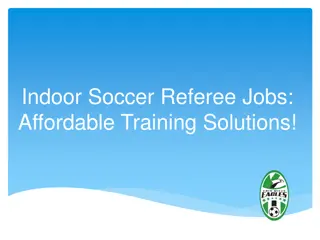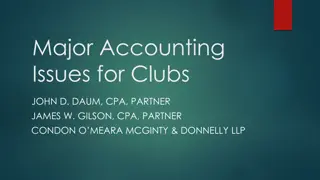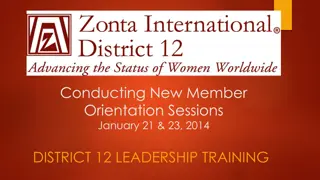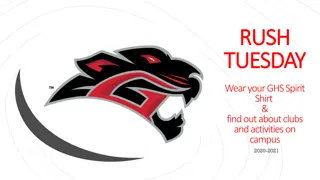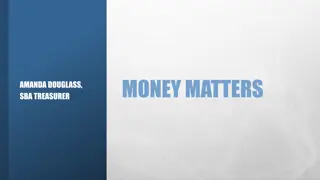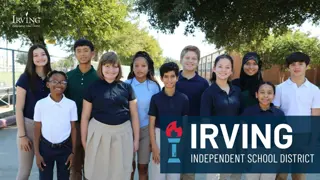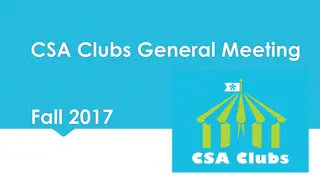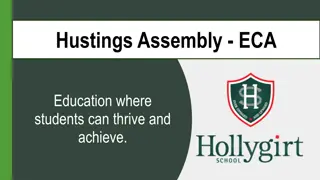Understanding Financial Best Practices for NC 4-H Clubs
The article discusses the transition of tax-exempt status for 4-H groups in North Carolina, detailing the importance of Group Exemption Numbers (GEN) and the implications of changes in federal income tax regulations. It explores the history of tax exemptions for 4-H clubs, highlighting the IRS rulings that have shaped the financial landscape for these organizations. The need for state-level tax exemptions is emphasized, shedding light on the impact of these regulations on fundraising and donor contributions.
Download Presentation

Please find below an Image/Link to download the presentation.
The content on the website is provided AS IS for your information and personal use only. It may not be sold, licensed, or shared on other websites without obtaining consent from the author. Download presentation by click this link. If you encounter any issues during the download, it is possible that the publisher has removed the file from their server.
E N D
Presentation Transcript
4-H Financials: Best Practice & Program Update Shannon McCollum, Extension Associate NC CES 4-H/FCS
TRANSITIONING TO THE NEW NORTH CAROLINA 4-H GROUP EXEMPTION NUMBER
Until 2011, federal income tax exempt status of 4-H groups was provided through the Group Exemption Number (GEN) 2704 held by 4-H National Headquarters. The GEN is an Internal Revenue Service (IRS) determination that formally recognized all chartered 4-H Clubs and affiliated 4-H organizations nationwide under the control of Cooperative Extension for inclusion as a subsidiary of the national 4-H special exemption under the provisions which correspond to section 501(c)(3) of the IRS Code.
This meant that formally authorized 4-H groups were: exempt from paying federal income tax on funds raised on behalf of 4-H, or to support educational programs; and donors could deduct contributions to 4-H clubs and affiliated 4-H organizations such as bequests, legacies, devises, transfers, or gifts as applicable under the IRS Code. This tax exempt status DOES NOT exempt your group from any state or local taxes, such as hotel tax, property tax, sales tax, personal income tax, or other taxes As a result of the GEN number held through 4-H National Headquarters being eliminated, all states were directed to secure tax-exempt status for 4-H groups.
Federal Income Tax A ruling issued to the Department of Agriculture by the Internal Revenue Service April 24, 1946, recognized that 4-H Clubs were exempt from Federal income tax under section 101(6) of the Internal Revenue Code of 1939, which corresponds to section 591(c(3)) of the 1986 Code. A ruling issued by the Department of Agriculture by Internal Revenue Service February 9, 1973, recognized that all affiliated 4-H organizations authorized to use the 4-H name and emblem by the Department of Agriculture are eligible for inclusion in the original ruling of April 24, 1946.
As a result. For North Carolina 4-H clubs and groups to maintain exemption from federal income tax, North Carolina State University requested from IRS, a Group Exemption Letter which will extend its tax exempt status and establish a GEN for North Carolina 4-H. North Carolina 4-H clubs and Groups will be subordinate organizations that are affiliated with and under the general supervision of the North Carolina State University. This application was submitted almost 2 years ago.
Each 4-H Affiliate/Entity will: File an annual IRS 990-series tax form Maintain an active Employer Identification Number (EIN) Submit an annual financial report to the Extension office Have an audit/review of their finances conducted each year or when the primary volunteer handling finances changes)
NC State University will hold the GEN for All 4-H Clubs, Groups, Associations, Councils etc. Those 4-H Entities which responded to the deadline back in 2011 were included on the original application Once our GEN application has been approved and a number is assigned, we will bring all other clubs into the NC 4-H/NC State GEN. Per IRS regulations, NC State must be able to demonstrate evidence that all clubs/groups are following established guidelines and have control over each 4-H entity that is included in the GEN.
Examples of 4-H Affiliates 4-H Clubs 4-H Advisory Boards 4-H Leader s Association NC 4-H Honor Club NC 4-H Alumni Livestock Clubs Horse Advisory Groups/Councils Any group working as 4-H that has any money. Etc ..
Good to Know! 4-H money is public funds Regardless of the source all funds must be used for 4-H Youth Development educational programs Must follow certain criteria Chartering Reporting
Why do you need a charter? The 4-H name and emblem are protected under federal statute Title 18, U.S. Code 707. The 4-H Name and Emblem is intended to represent the ideals of the program with its focus on serving educational needs and interests of 4-H youth. Permission for use of the name and emblem can be given by the 4-H Agent. Charters ensure that clubs/groups are functioning according to the rules and regulations of NC 4-H.
Club/Group Charters Identifies as a 4-H Club/Group Authorizes to use 4-H Name and Emblem Completed ANNUALLY Requirements: At least FIVE/Six members Trained volunteers 6 Month Calendar Elected Officers or Age Appropriate Roles Club Roster
Gold Seal The following are the minimum requirements for a 4-H club/groups to renew their charter. Clubs/groups are required to re-charter on an annual basis in order to remain a 4-H club/group and continue to use the 4-H logo and emblem. Once clubs/groups have submitted and completed the requirements, clubs should receive the gold seal on the original charter.
Gold Seal 1. List of club officers are on file with the County Cooperative Extension office. Officers have been either elected or rotated into office. 2. The club/group completed at least one community service project during the year. 3. Enrollment forms have been updated and submitted to County Cooperative Extension office. 4. Annual financial report has been submitted to county Cooperative Extension Office. 5. Organizational (club/group) leader had attended a minimum of one 4-H volunteer training during the calendar year. 6. The club meets consistently throughout the year.
Emerald Seals The following are the minimum requirements for a 4-H Club/Group to receive an Emerald Seal. 4-H Clubs/groups are not required to apply for an emerald seal. These specific requirements are based on research defining best practice for 4-H clubs/groups. The Emerald Charter Seal is attached to the Club/Groups Charter at the time of renewal. Seals should be presented to a club/group at the appropriate or meeting. In addition to the renewal of charter requirements, seals will be presented to clubs/groups meeting the following criteria
Emerald Seals 1. 50% of youth will have been engaged in 4-H Life Skill development opportunities such as local/district/state/national activities, project records, presentations, or 4-H camp. 2. Club/Group have completed a minimum of at least two community service activities during the club year. 3. Club/Group youth have completed a minimum of one citizenship activity 4. Club/Group youth have participated in an annual achievement program.
Using the Clover The 4-H Emblem is protected and belongs to the 4-H Youth Development Program under the authority of the USDA. Your clubs/groups MUST be chartered before you can use the 4-H name and emblem. Specifics about the Emblem Colors H s Stem Downloadable Graphics http://national4-hheadquarters.gov
How to Handle Money If the club/group chooses to handle money (dues, fundraisers, etc), they must open a 4-H checking account. Clubs/Groups need to be in active charter status to handle funds (re-chartering as of October 1 of the current year or recently chartered.) Clubs/Groups need to be in good standing with the 4-H office. All required forms on file Obtain an Employee Identification Number (EIN) from the IRS http://www.irs.gov Open a bank account with new EIN in the name of the 4-H Club/Group.
Required financial forms that the County 4-H Office will need are: Fund Acknowledgement Letter Articles of Organization NC 4-H Group or Articles of Organization NC 4-H Club North Carolina 4-H Registration Maintain finances with Club Treasurers Guide (Green Publication order under 4-H publications)
Uses 4-H Treasurers guide to record all deposits and expenditures. File annually with IRS: Form 990 (February) Files by February each year with IRS using the electronic 990 postcard When filing if club receives an error just print the error screen and file it.
4-H Office should have a copy of all financial records and correspondences Use 4-H club/group Finance checklist Agent needs to set up audit committee and provide times for clubs to schedule audits for their financial record.
How to Handle Money 4-H Funding Proposal located in the Club Treasurer s Guide p. 16 Completed and approved by County 4-H Agent or designated staff BEFORE club/group begins a fundraiser. Monthly Treasurers Report Treasurer and Club/Group Leader work together to complete. Present to club/group during business portion of club meeting. Annual Financial Report REQUIRED must be submitted to County 4-H Office each year.
The ideal Club financial packet NC 4-H Treasurer s booklet SS-4 (Application for an EIN #) Fund Acknowledgement Letter Articles of Organization NC 4-H Club/Group Club/Group finance Checklist FAQ sheet Timeline for County deadlines (Review dates, trainings, etc)
Charitable Donation If a donor gives you money for your program and you deposit it into your club/group accounts, this is not a charitable contribution. If a Donor wants to make a charitable contribution and wants to receive a receipt, then the check needs go into the NC Agricultural Foundations.
Best Practices Must maintain public trust. Establish accountability practices.
Best Practice: Financial Management Procedures Must have a clean, clear cut structure for responsibilities of everyone involved: Names of those who may sign on the account EIN (Employee identification number) on the account) Physical location of all accounts Names of those responsible for auditing the records at the end of the Fiscal year.
Maintain a record of financial activities: Original invoices and receipts Money received (date, from whom, amount, purpose) Money spent (date, by whom, amount, purpose) Names on signature card (updated when appropriate)
Record cash receipts and deposits daily or upon receipt Secure cash and receipt Checks should be written to club/group name only Reconcile statement every month Club/Group establishes a budget annually
Person who collects the funds and writes the check should be different people. Person who writes the checks should not be the one who reconciles the statement.
4-H in North Carolina is exempt from Federal Income Tax Clubs/groups must file annually a form 990 or 990-N Must have an EIN number from IRS.
Frequently Asked Questions What is an EIN? The Employer Identification Number is a unique identifier for an organization, much like we each have our own Social Security Number. How do clubs obtain an EIN? Club or group leaders complete the IRS SS-4 form, Application for Employer Identification Number and send it to the IRS. Club leaders need to complete all the fields, using the information provided. Does every group need to obtain an EIN? reporting income to the IRS using a 990. New IRS requirements, in compliance with The Pension Protection Act of 2006, require small tax exempt organizations to file annually with the IRS. This includes groups earning from $0 up to $25,000, or in the absence of active fundraising, groups that may accept a donation. Only those groups with $0 income and no intention of accepting gifts are not required to have an EIN. Those making $25,000 or more each year should already have an EIN and be
What about 4-H military clubs? GEN as these clubs do not handle money nor have bank accounts. Any fundraising conducted by these clubs must be sponsored by an appropriate private organization (i.e., a military Officers Wives Club or Youth Booster Club) that handles funds and records on the club s behalf. Army and Air Force 4-H Clubs do not need an EIN nor inclusion under the National 4-H
Frequently Asked Questions: Handling funds with 4-H What address should be used for the contact person? The volunteer leader should be the contact person. This can be changed should the club leader position change. What goes in fields 11 and 12 (business start date & closing month of accounting period)? The North Carolina 4-H Club Reporting Year is October- September (October is the financial start date and September is the closing month of accounting period) Do I list a county agent as a third party designee? No, doing so would make a public extension employee legally responsible for the group.
Frequently Asked Questions What information does a group leader need to file an ePostcard? It s a short, simple list of information, including the legal name of the club/group, mailing address, EIN, annual tax period, annual gross receipts, and if the group has terminated. When do groups file the e-Postcard? This annual electronic notice is due by the February 15th each year, the 15th day of the 5th month after the close of business (end of club year) in North Carolina 4-H. What happens if a group doesn t file by the deadline? Recognize that the IRS is operating on a 3-strikes-and-you re-out ruling IRS fees will apply for groups that repeatedly fail yet try to get on the list.






